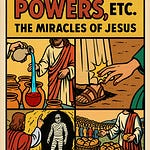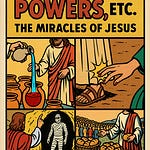James, 1.18-25
The lectionary epistle for this Sunday is from the beloved and/or loathed Letter from Jesus’s brother James.
Here’s a sermon from the vault on the passage:
True story— I heard it on NPR:
One warm summer night in DC, eight friends gathered around a backyard supper table. Toasting family and friends, clinking wine glasses, laughing— they were throwing a celebration.
“It was one of those great evenings,” the celebrant of the party, Michael, told the host of Invisibilia, “lots of awesome food and french wine. It was a magical night.”
It was getting late, he remembers, maybe around 10:00 PM, when it happened.
“I was standing beside my wife. And I just saw this arm with a long-barrel gun come between us. It was as if in slow motion…this hand and a gun, and then it just really quiet.”
The trespasser was a man of medium height in clean, high-end sweats. The trespasser raised the gun and held it first to the head of Michael’s friend, Christina, and then to the head of Michael’s wife and then he said: “Give me your money.”
And he kept repeating it, louder and louder.
“The problem was,” Michael said, “none of us had any cash.”
So the celebrants started to grasp for some way to dissaude the instruder out of his trespass, grasping for some way to change his mind.
But then—
One of the women at the supper table, his friend Christina, piped up and she spoke a strange word, a word that passed from her lips to the trespasser’s ears and cut through all the angry noise and frightened chattering.
She said: “We’re celebrating here. Why don’t you have a glass of wine?”
“The words, her invitation…it was like a switch. You could feel the difference it made,” said Michael to Invisibilia. “All of a sudden, the look on the man’s face changed. The words arrested him. It was like the words gave him something he didn’t know he was searching for.”
According to Michael—
The trespasser tasted the wine offered to him in spite of his trespass. “That’s really good wine,” the trespasser said to Michael.
“We had some bread too,” Michael added, “so he reached down for some of it but because he had the wine glass in his other hand…he put the gun in his pocket to free up his hand.”
The trespasser drank his wine.
And then the trespasser said something surprising: “I think I’ve come to the wrong place.” Everyone stood there in the backyard garden, the trellis walls like a sanctuary and the treetops a steeple, everything silent as a grave save the thrum of summer insects.
Then the trespasser said something strange: “Can I get a hug?”
First Michael’s wife embraced him.
Then his friend Christina embraced him.
Finally, like they had no choice— like they had to celebrate with him— the whole party gathered around and embraced the trespasser. “I’m sorry,” the man said, “I’m sorry I trespassed against you.” And then he walked out into the street, still carrying the wine as though he were savoring still at how he’d been given it.
In the episode of Invisibilia, Michael’s story is cited as an example of what psychologists call noncomplementary behavior.
But in the Church, Michael’s story is an example of what scripture calls saving faith. Michael’s story of the word of invitation to the trespasser who trespassed against them— it’s an example of how saving faith works.
Now, I know that’s not immediately obvious to you so I’m going to say it again.
Michael’s story is an example of how faith works.
Despite the word on the street, the gossip’s got him all wrong.
St. James in his four page letter— and keep in mind, it’s just four pages— does not contradict the teachings of the Apostle Paul, which, keep in mind, total almost two hundred pages of your New Testament. And you don’t need to take my word for it.
According to Luke in the Book of Acts, James, who was Jesus’ half-brother and the leader of the Church in Jerusalem, eventually agreed with the Apostle Paul’s preaching. In the Book of Acts, Luke records James agreeing with the Apostle Paul that absolutely nothing should be added to the Gospel of Grace. And nothing can substract from your standing in it.
So if you hear James here exhorting you that God’s work of grace in Jesus Christ requires you to respond with good works of your own, then read it again. Read it through the Apostle Paul rather than alongside him because, well, it’s two hundred pages to four pages, and James himself says that’s how you should read him.
In fact, James here in chapter one is riffing on what St. Paul says in his Letter to the Romans: “Faith comes from what is heard and what is heard comes by the preaching of Christ.” And what James tells us here in chapter one echoes what St. Paul tells the Corinthians: “No one can confess Jesus is Lord— no one can have faith— except by God.” In other words, saving faith comes not from within but from without.
Faith is not your doing— that’s Paul to the Ephesians.
James makes the same point in this text. “In fulfillment of his own purpose,” James writes, “God gave us birth…” God gave us birth as believers. That is, God gave to us faith. How? By “the word of truth,” James says. By the promise— by the Gospel of grace.
And God gives us faith, James says, “so that we would become a kind of first fruits of his creatures.”
Fruit— just like Paul and just like his brother Jesus, the controlling image that James chooses is a passive one. We’re not the Gardener. We’re not even the plant. We’re fruit. God gives us faith not so that we will go do. God gives us faith so that we might become fruit— signs— of what he has done.
It’s not so much that we are to bear fruit. It’s that faith makes us fruit. A couple of verses down from here, James continues with the metaphor of God as Gardener by calling the Gospel the implanted word.
What James tells you here is no different than what the Apostle Paul preaches in the other two hundred pages of the New Testament. Namely, God uses the Gospel promise to plant faith within us.
The promise that Christ has died for all our sins, once for all, that everything has already been done, that nothing needs to be done to redeem you or your neighbor,createsfaith.
You see, when scripture speaks of saving faith, it’s not primarily faith in something— you can have faith in all sorts of things, just ask the Golden Calf or Tom Brady fans.
When scripture speaks of saving faith, it’s faith from someone.
Listen to this episode with a 7-day free trial
Subscribe to Tamed Cynic to listen to this post and get 7 days of free access to the full post archives.












